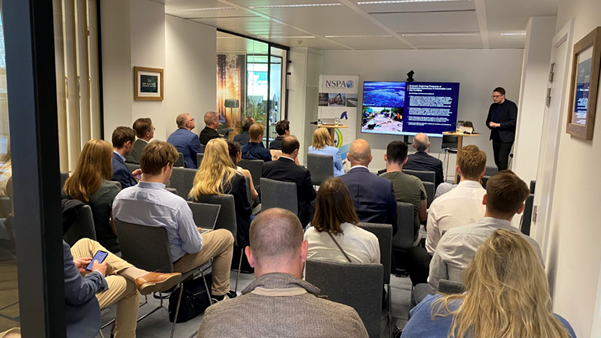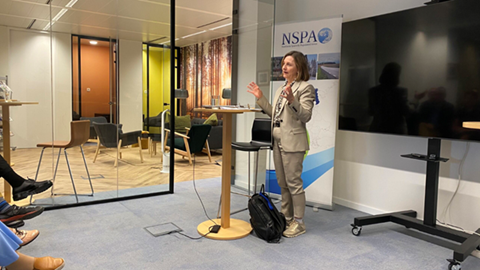Event on Arctic Perspectives in the EU Research Agenda in Brussels

On the 13th of May, the Arctic Five and Northern Sparsely Populated Areas (NSPA) networks organised an event on the theme: Arctic perspectives in the EU research agenda. The event was held at the North Sweden/North Norway European Office in Brussels in connection with the EU Arctic Forum and the Indigenous Peoples' Dialogue. The seminar discussed the role of Arctic research in the transition the region is undergoing with the new geopolitical situation and the green transition.
The Arctic is a key player for the EU in terms of renewable energy, green industrial transition and critical raw materials, but also in terms of security issues stemming from the new geopolitical context. At the same time, the region is at the forefront of climate change impacts. The region's specific social, environmental and economic characteristics are highly affected by climate change. The event thus aimed to highlight the importance of climate research as an essential part of the Arctic research agenda, but also to discuss the role the EU research agenda should and can play in informing policy decisions and shaping strategies for sustainable development in the Arctic. At the centre of the discussions was the question: How can Arctic research respond to the needs arising from the transition the region is undergoing?
The event brought together stakeholders from the EU arena as well as those traveling down for the EU Arctic Conference later that same week. The participants are interested in Arctic research in different ways, either as policymakers, researchers with activities in Arctic research, or as a stakeholder seeking knowledge for the continued sustainable development of the EU's Arctic regions. The event's moderator was Dag Avango, Professor at Luleå University of Technology and Director of Arctic Five.

European Arctic of growing importance for the EU
The European Arctic is gaining strategic importance in areas such as renewable energy, industrialisation under the green transition, and related extractive industries. With this development comes a wide range of opportunities, but also challenges such as land use tensions and local environmental impacts, as well as difficulties in attracting the necessary labour force. The first panel session discussed how competing interests and perspectives could be addressed through a deeper understanding of the challenges, and how joint research, innovation and education activities can contribute to the sustainable use of natural resources and increased societal acceptance of the green industrial transition.
The second panel session touched upon the Arctic security dimensions and the need for long-term and short-term research and innovation on Arctic security to better understand the new geopolitical situation in the region. The session discussed the impacts that the changing security situation in the world has on the Arctic and how research can contribute to a better understanding of risks and dynamics in the region.

The event concluded with a keynote speech by Clara Ganslandt, Special Envoy for Arctic Affairs at the European External Action Service. Ganslandt gave an overview of all the EU policies that in different ways influence and support the development of the EU's Arctic regions, from cohesion policy to research and space activities.
Briefly about Arctic Five and Northern Sparsely Populated Areas
The Arctic Five is a partnership between five research universities in the Swedish, Finnish and Norwegian Arctic. The institutions develop innovative research and education relevant to the Arctic. Together they represent the most comprehensive research and education infrastructure, with over 10,000 researchers and 90,000 students in the European Arctic.
The Northern Sparsely Populated Areas (NSPA) network represents the interests of the four northernmost regions of Sweden (Norrbotten, Västerbotten, Jämtland Härjedalen and Västernorrland), the seven easternmost and northernmost regions of Finland (Central Ostrobothnia, Kainuu, Lapland, North Karelia, North Ostrobothnia, North Savo and South Savo) and the three northernmost regions of Norway (Nordland, Troms and Finnmark).
Read more about the Arctic Five here: https://arcticfive.org/
Read NSPA's position paper on the Horizon Europe Strategic Plan 2025-2027 here: https://www.nspa-network.eu/media/5h4f4zxo/nspa-position-paper-on-horizon-europe-strategic-plan-2025-2027.pdf
